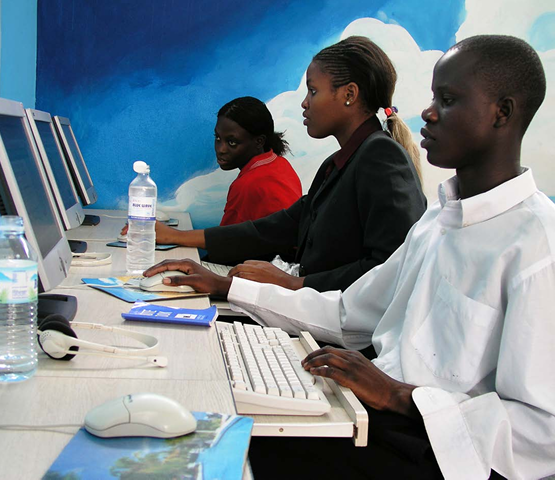Illustrative Image: Ghana’s Digital Revolution: How Smart IDs, AI Hubs, and Innovation Could Unlock Economic Growth and Close the Gap with South Korea
Image Source & Credit: IFC
Ownership and Usage Policy
From smart national IDs to AI-powered innovation hubs, Ghana’s digital revolution is laying the foundation for a transformative economic future. By embracing digitisation, the country could fast-track growth, modernise governance, and narrow the development gap with global peers like South Korea.
Lessons from South Korea’s Divergent Path
Ghana and South Korea both emerged from colonial rule and war around the same period in the mid-20th century. Yet, their economic trajectories could not be more different. South Korea, once poorer and resource-constrained, is now an advanced economy with an income level almost nine times that of Ghana.
How did this happen? After the devastation of the Korean War (1950–1953), South Korea pursued pragmatic strategies: ensuring food self-sufficiency, expanding basic education, advancing healthcare, and prioritising family planning. Fertility rates fell sharply, creating a demographic shift where the working-age population grew faster than dependents. By 2016, the ratio of workers to dependents had risen to nearly 3:1, allowing South Korea to invest in human capital and boost productivity. This laid the foundation for industrialisation, export-led manufacturing, and rapid growth.
In contrast, Ghana’s journey has been constrained by high population growth, governance challenges, and slower technological adoption. Despite being resource-rich, Ghana’s reliance on raw material exports, especially gold, limited its ability to industrialise at scale.
Ghana’s Demographic Transition: A Window of Opportunity
Today, however, Ghana is entering a promising new phase. With a population of about 34 million (2023), Ghana is more urbanised (around 60%) than most African nations—a milestone South Korea only reached in the early 1980s. Urbanisation brings significant advantages: easier delivery of services, better infrastructure for digital rollouts, and concentrated hubs of innovation and productivity.
Fertility rates have also declined to 3.4 children per woman, signalling Ghana’s approach toward its demographic dividend window—a period when the workforce significantly outnumbers dependents. This is expected to begin around 2033, earlier than in most West African countries. If managed wisely, this demographic shift could propel Ghana into upper-middle-income status by mid-century.
But this transformation hinges on how effectively Ghana leverages digital technologies to modernise its governance systems, economic structures, and social services.
Building the Foundations of a Digital Economy
Over the past decade, Ghana has made notable strides in digitisation.
-
Smart ID System (Ghana Card):
Introduced in 2008 and rolled out nationally from 2018, the biometric-based national ID system has become the backbone of Ghana’s digital economy. With more than 18.7 million citizens enrolled by 2025, the Ghana Card serves as a unique identifier (PIN) for banking, education, SIM registration, business ownership, property transactions, and even voter registration. By linking the informal sector to formal systems, the ID enhances access to credit, enables digital transactions, and strengthens governance transparency. -
Digital Address System (GhanaPostGPS):
Every 5m² of land is now digitally mapped, solving the long-standing challenge of locating addresses. This has unlocked e-commerce, drone deliveries, business registration, and financial inclusion for small enterprises. -
Paperless Ports & Digital Government Services:
Linking trade documentation to PINs has reduced fraud at harbours, while government service payments are fully digitalised. Efforts are underway to digitise land records using blockchain, enhancing property rights security. -
Education & Skills Development:
Supported by the World Bank, Ghana is integrating e-learning in schools and has launched the One Million Coders initiative to equip youth with critical digital skills. -
AI & Innovation Hubs:
Global tech giants are recognising Ghana’s digital momentum. Google set up its first African AI research centre in Accra, while a $1 billion partnership with the UAE is paving the way for a high-tech hub hosting Microsoft and Meta by 2027. -
Mining Regulation Through Technology:
To combat illegal mining, drones are now deployed by trained pilots to monitor activities, making natural resource management more transparent and safer.
Economic Implications of Digitisation
Digitisation has the potential to transform Ghana’s economic structure in several ways:
-
Formalising the Informal Sector: By linking mobile banking, IDs, and digital addresses, millions of small businesses can join the formal economy, access loans, and pay taxes.
-
Boosting Government Revenue: Studies suggest African countries could raise revenues by up to 20% of GDP through effective tax collection aided by digital systems.
-
Improving Service Delivery: Paperless transactions cut corruption, streamline bureaucracy, and reduce inefficiencies.
-
Enhancing Global Competitiveness: AI hubs, coding initiatives, and digital infrastructure position Ghana as a leader in Africa’s innovation economy.
Challenges and Cautions
Despite progress, obstacles remain. Political cycles often lead to populist spending and incomplete projects, undermining long-term plans. Initiatives like the One District One Factory (1D1F) programme faltered due to poor design and execution. Furthermore, infrastructure gaps, digital literacy disparities, and governance weaknesses could slow momentum if not addressed.
The Road Ahead
Ghana is at a crossroads. With favourable demographics, strong urbanisation trends, and digital foundations, the nation has an unprecedented opportunity to transform its economy. But success will require consistent governance reforms, prudent fiscal policies, and deeper investments in education, innovation, and technology adoption.
Closing the gap with South Korea will not happen overnight—it could take decades. But the building blocks for a new growth trajectory are in place. If Ghana sustains its digital momentum and aligns it with inclusive policies, it can shift from reliance on raw materials to a diversified, technology-driven economy.
In short, Ghana’s digital revolution is not just about modernising systems—it is about redefining its place in the global economy.
















 The African Research (AR) Index is a comprehensive scholarly directory and database focused explicitly on journal publishers that publish and disseminate African research.
The African Research (AR) Index is a comprehensive scholarly directory and database focused explicitly on journal publishers that publish and disseminate African research.

